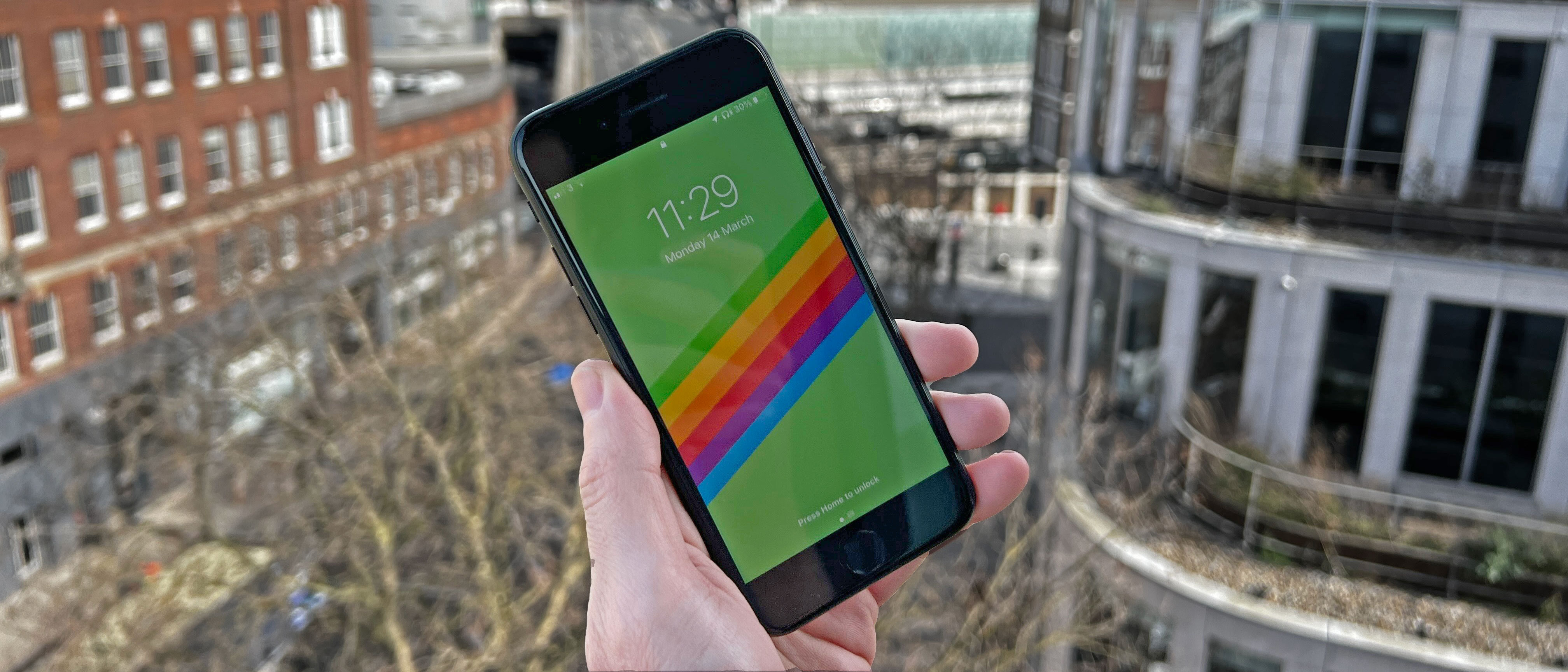TechRadar Verdict
The iPhone SE (2022) is faster and better-connected than its predecessor, and at the most attractive price currently possible for a new 5G iPhone. However if you're looking for a better iPhone deal with bigger screens, better cameras, and a bigger list of modern specs, the new SE might not be for you.
Pros
- +
Powerful for the cost
- +
A 5G iPhone that's still affordable
- +
Thin and lightweight design
Cons
- -
Starts at only 64GB storage
- -
Screen is cramped
- -
More expensive than SE 2
Why you can trust TechRadar
Two-minute review
If you like your iPhone affordable and retro, Apple's iPhone SE 2022 edition might be the best iPhone for you.
It keeps the SE series design language firmly rooted in 2017 – that was the year Apple launched the iPhone 8, the design of which Apple employed for 2020's SE 2, and has stuck with for this new phone.
In 2020, Apple took that chassis and upgraded the CPU to an A13 Bionic, the rear camera to a 12MP wide, and introduced 'monocular depth estimation,' which improved Portrait Mode photography for the front and rear cameras. It was a nifty AI-infused trick that worked like a charm on faces, but nothing else.
All those things you loved from the iPhone SE (2020) remain in the iPhone SE (2022). There's been no change to the thin and light body, no reintroduction of the 3.5mm headphone jack, no removal of the Touch ID. The Liquid Retina display is untouched. The cameras - a 12MP rear and 7MP front - are the same, too.
The difference, and it is bigger than you think, is the new A15 Bionic, the very same Apple Silicon you'll find in Apple's iPhone 13 line. It's a powerful mobile CPU that - to date - beats even Qualcomm's latest Snapdragon 8 Gen 1 CPU (in Geekbench scores).
It's a lot of power and headroom for a tiny, 4.7-inch screen smartphone that doesn't even have a depth sensor on the front. Still, the A15 Bionic is up for anything, from shooting and editing 4K videos to playing intense action games like Call of Duty and PUBG.
The A15 is a system on a chip, which means the graphics processing is integrated, and that in turn means better image processing. Even though it still has the same camera as its predecessor, the iPhone SE (2022) is capable of timelapse night photography (though you'll need a tripod).
Inevitably though, there are limits to what's on offer here compared with Apple's flagship phones. All the A15 Bionic-sporting iPhone 13 phones support the new Cinematic mode video (bokeh-effect), but there's no such video control on the new iPhone SE.
Speaking of things missing from this new phone. The iPhone SE (2022) follows Apple's new packing strategy: No more power adapter or wired earbuds in the box.
From an environmental perspective, this makes a lot of sense. It is unfortunate, though, that the price rose $30 to $429 at the same time Apple pulled these accessories. Accounting for inflation, however, the price might be considered roughly the same as it was two years ago. I don't expect that argument to fly everywhere.
Battery life is 12 hours, which is notable considering the more powerful CPU and eye-brow singeing 5G connectivity, but it's not in the same league as the handsets in the iPhone 13 family.
It's hard to wholeheartedly recommend the iPhone SE 2022, when you can spend a little more for the iPhone 13 mini, which has a bigger, brighter, and shaper Super Retina XDR OLED screen, another camera, Face ID, and a fresher design (and you can pick up some of the lower-end iPhone 11 and iPhone 12 options for a similar premium).
Even so, there is still something charming about the look and feel of Apple's aging iPhone design. And getting all that performance and 5G for under $500 is nothing to sneeze at either.
For Apple devotees, the brand can set the pricing and options agenda for its iPhones, safe in the knowledge that it doesn't have to engage in a race to the bottom against lower-end Androids.
The iPhone SE (2022) carries on that tradition in mostly fine form. However, it changes nothing aesthetically about the last model but builds on it with Apple's latest chip and mobile connectivity technology - whether that's enough for you is a personal decision.
However if you’re looking for a new iPhone that offers and costs more, allow us to point you to the iPhone 13 series, which comprises the iPhone 13 itself, the iPhone 13 mini (the iPhone SE consistently outsells the mini line), the iPhone 13 Pro and the iPhone 13 Pro Max.
iPhone SE price and availability
- Not the cheapest iPhone ever at $429 / £419 / AU$719
- New iPhone SE is available as of March 18, 2022
- Available in the US, UK and Australia
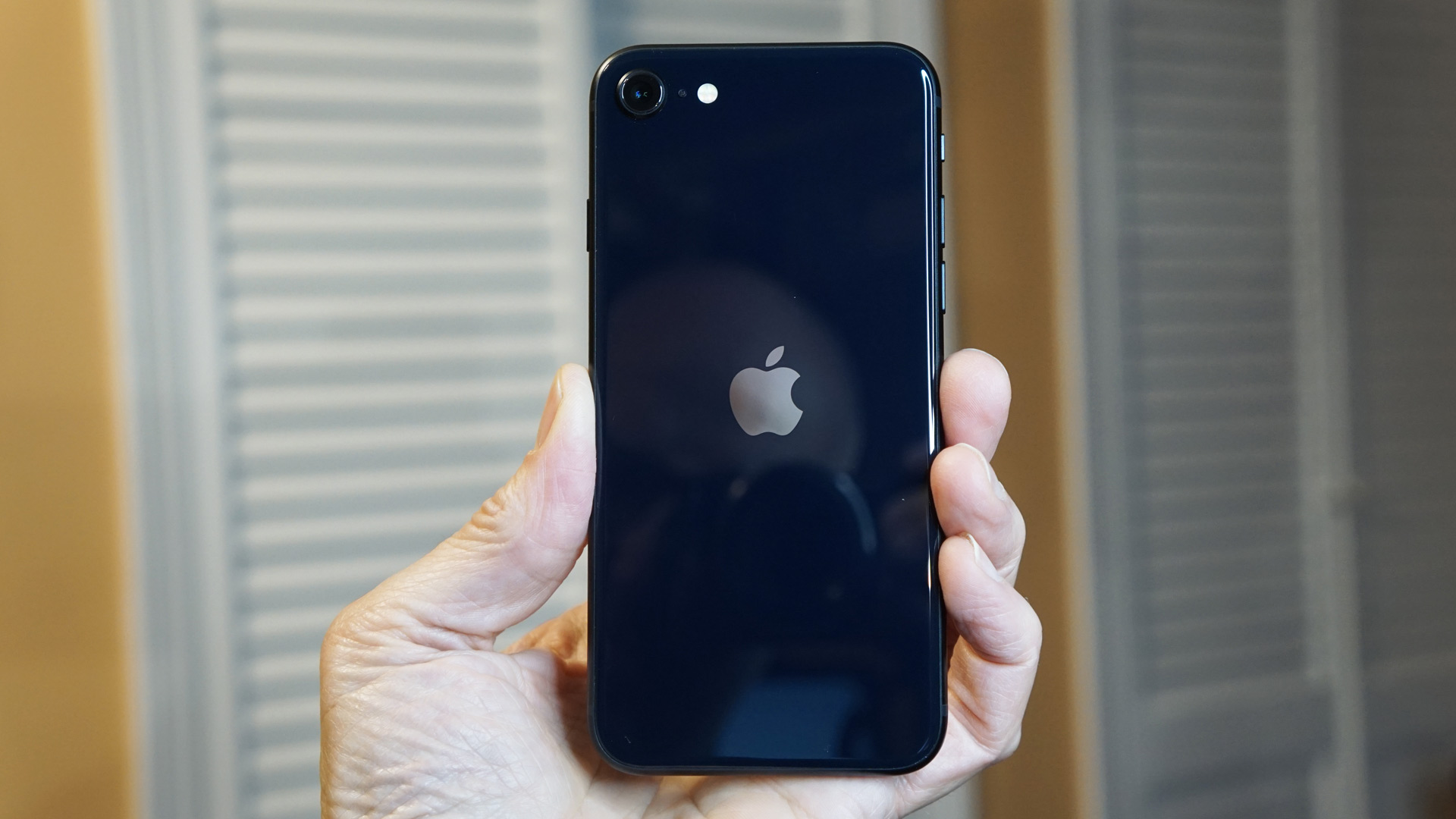
The iPhone SE (2022) has gotten a price hike over its predecessor to $429 / £419 / AU$719, but it still qualifies as Apple's cheapest 5G phone. The iPhone 13 mini starts at $699 / £679 / AU$1,199 and the iPhone 12 mini starts at $599.
However, it is more than a little frustrating that Apple insists on offering a phone with just 64GB of storage to start. The phone shoots up to 4K, 60fps video. Where are all those files supposed to go? Apple's iPhone 13 line now starts at 128GB across the board. That's the standard Apple should've followed here. The issue is compounded because the iPhone SE (2022) tops out at 256 GB of storage ($579 / £569 / AU$969), though there's also a 128GB option for $479 / £469 / AU$799.
If you're considering a 256GB iPhone SE at that price, then you really should start thinking about one of the iPhone 13 models.
The previous iPhone SE started at $399 / £389 / AU$679, and while asking for a little more for a 5G phone with the newest processor is not a big ask, consumers will notice the packaging is a bit smaller and lighter. The environment will thank Apple, but some consumers might be miffed that there are no longer wired earbuds and power adapters included with the device. That's the same for the iPhone 13 series, but the omission still might sting for budget-conscious iPhone consumers who now have to buy the accessories separately.
It's worth noting that you have just three color choices for the retro-looking device: Midnight, Starlight, and Product RED. Our test unit is a lovely and very deep blue Midnight.
Pre-orders for the phone started on March 11 and the device is now on sale (as of on March 18).
- Looking to buy? Check out the best iPhone SE deals
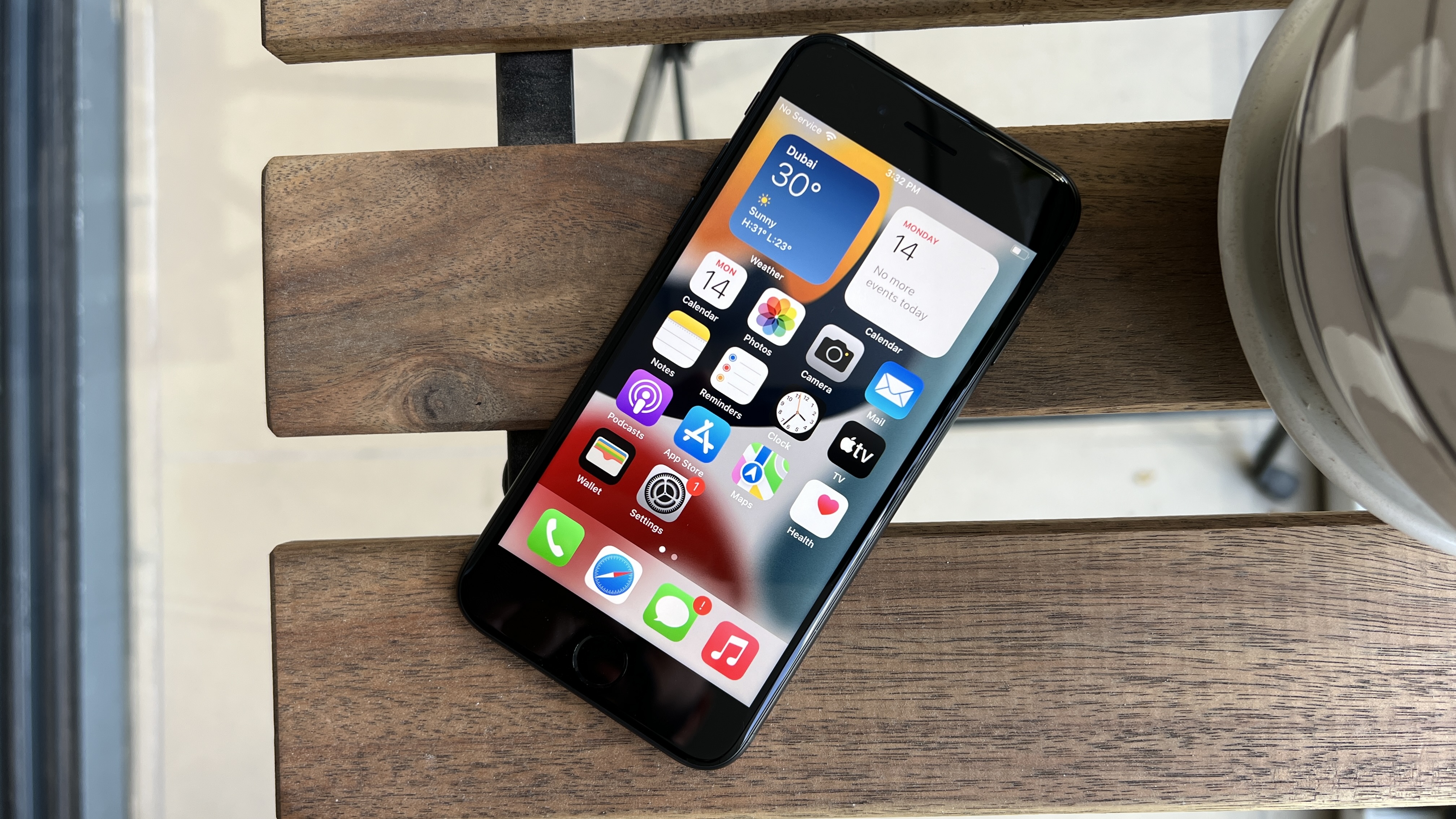
Design
- You've seen this design before
- Physical Touch ID button
- Light and super-comfortable to hold
There is familiar and then there is familiar. Apple's iPhone SE (2022) is such a well-worn look that I instinctually took to it, even though I know it's not a look that's 'in' right now.
The aluminum enclosure is smooth, clean, and, in our test model, gleaming Midnight. It looks black indoors, but the blue shines through in the sunlight.
The glass back and front are perfectly smooth, and it's almost quaint to see a single relatively tiny, 12MP wide-angle camera on the back in this age of ever-expanding camera blocks. The sapphire glass lens cover's distance from the backplane can be measured in a millimeter (maybe two).
There are almost no edges on the whole 5.44-in. by 2.65-in. by 0.29-in. 144g frame; know some people still complain about the sharp edges on the iPhone 13 and the new Samsung Galaxy S22 line; you'll have no such issues here. Along the left edge are the volume buttons and a sleep/silent switch, while on the right are the power button and the SIM slot (which also supports eSIM). The bottom edge features the speaker grilles, microphone, and Lightning port.
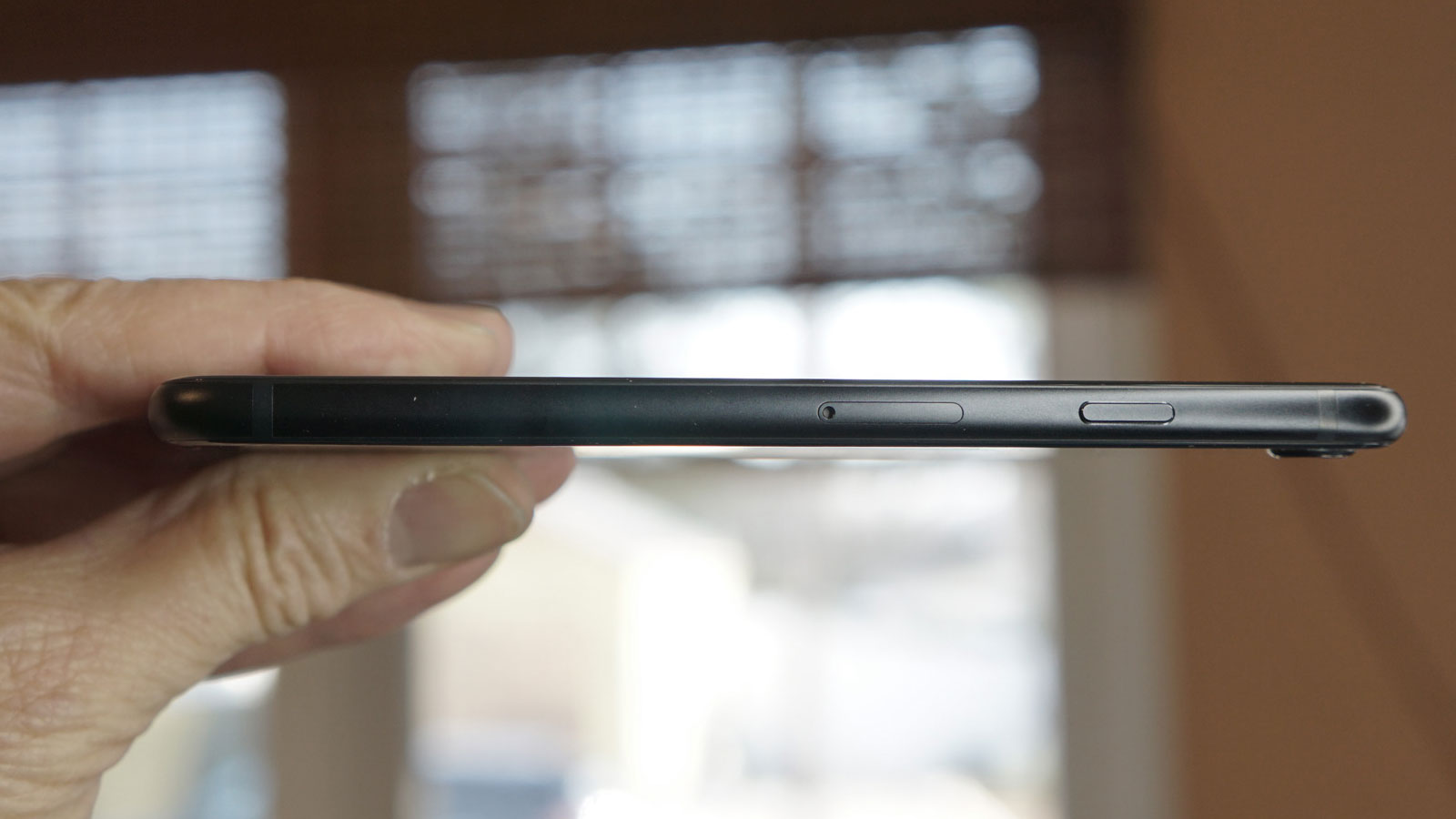
The front features the aging 1344 x 750 pixel Liquid Retina Display, which looks great on its own, but literally pales in comparison to, for instance, the iPhone 13 mini's 5.4-inch edge-to-edge Super Retina XDR display OLED screen.
Above the screen is the 7MP FaceTime and selfie camera, which sits next to a wide, shallow speaker grille.
Below all that is our old friend, the Touch ID home button. We've been living with Face ID, home-button-free iPhones for so long, that our reintroduction was a bit bumpy. I literally forgot how to use an iPhone with a home button to start with, although, it was a little like riding a bike, and I soon got back in the Touch ID groove. I remembered how much I liked the way the button felt as it read my fingerprint or faked a physical button press with expert haptics. It's time for the Touch ID button die, but it serves its purpose well here on the iPhone SE.
For what it's worth, Apple's Touch ID remains one of the most effective biometric authorization technologies I've ever used. Register a finger once and the reader will see it every time, in virtually any position.
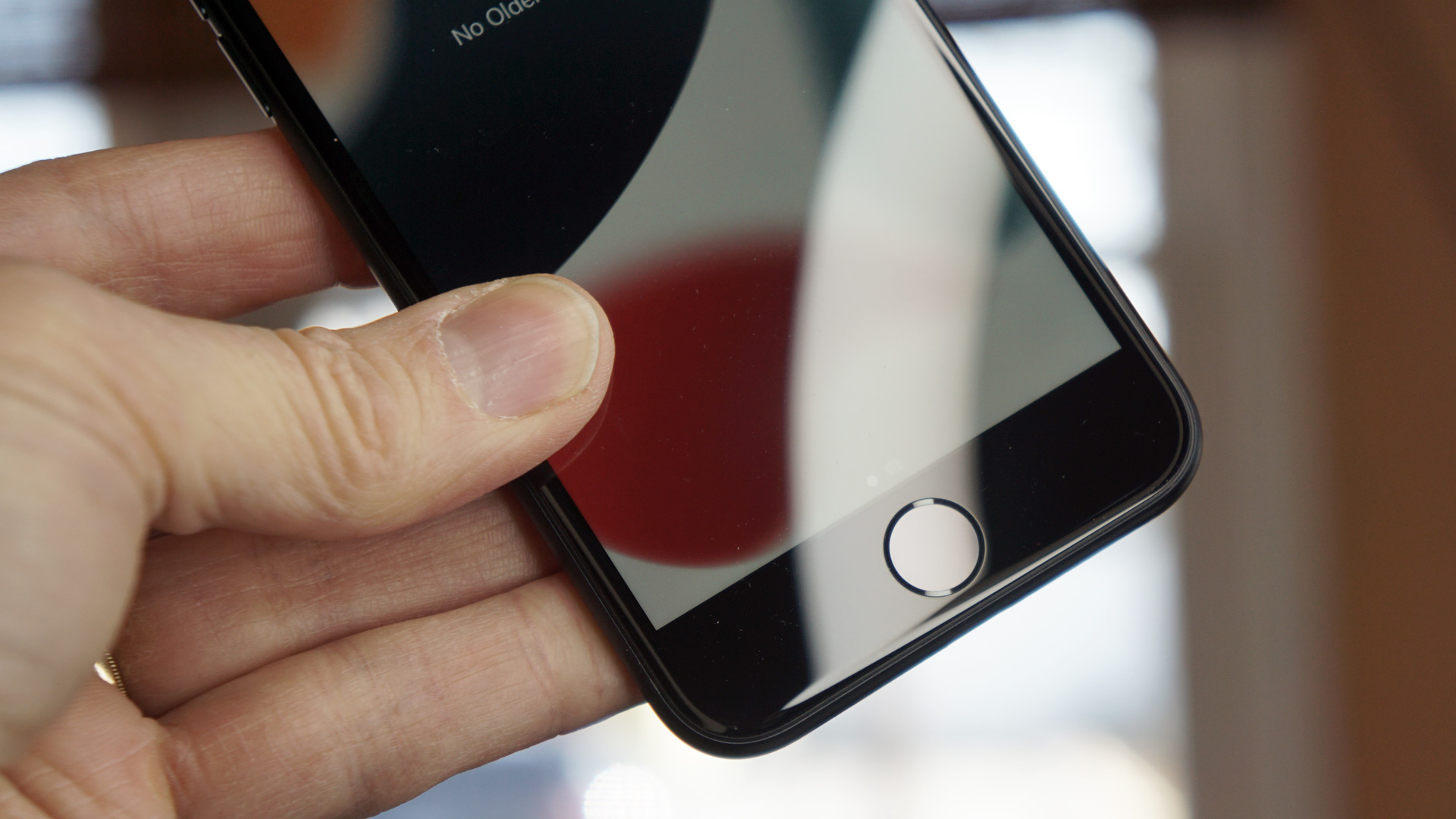
The iPhone SE (2022) is also water and dust resistant, with IP67 certification. I (accidentally) dropped the entire handset in water and it survived.
There is no 3.5mm headphone jack on the phone, but it does have a Lightning charging port, which could accommodate a pair of Lightning of earbuds. Those aren't included, sadly, but the phone does work perfectly with wireless AirPods if you have them. There's also a USB-C to Lightning port charging cable in the box.
Display
- 4.7-inch screen
- Small compared to contemporaries
- Well-protected
If you're upgrading from an iPhone 5S the iPhone SE's 4.7-inch screen might feel like an upgrade, but in a world of monster-sized displays, 2,000,000:1 contrast ratios, and adaptive refresh rates, its 60Hz LCD luster might feel out of step.
Comparing the SE's display to the best screens out there seemed pointless, though - if you want more, you will pay more (on any platform and from any handset manufacturer). In isolation though, the display looks good - across a wide variety of tasks from photography and videography, to web browsing, gameplay, and video, it looked good.
The screen can struggle in direct sunlight, but indoors, it's still a winner.
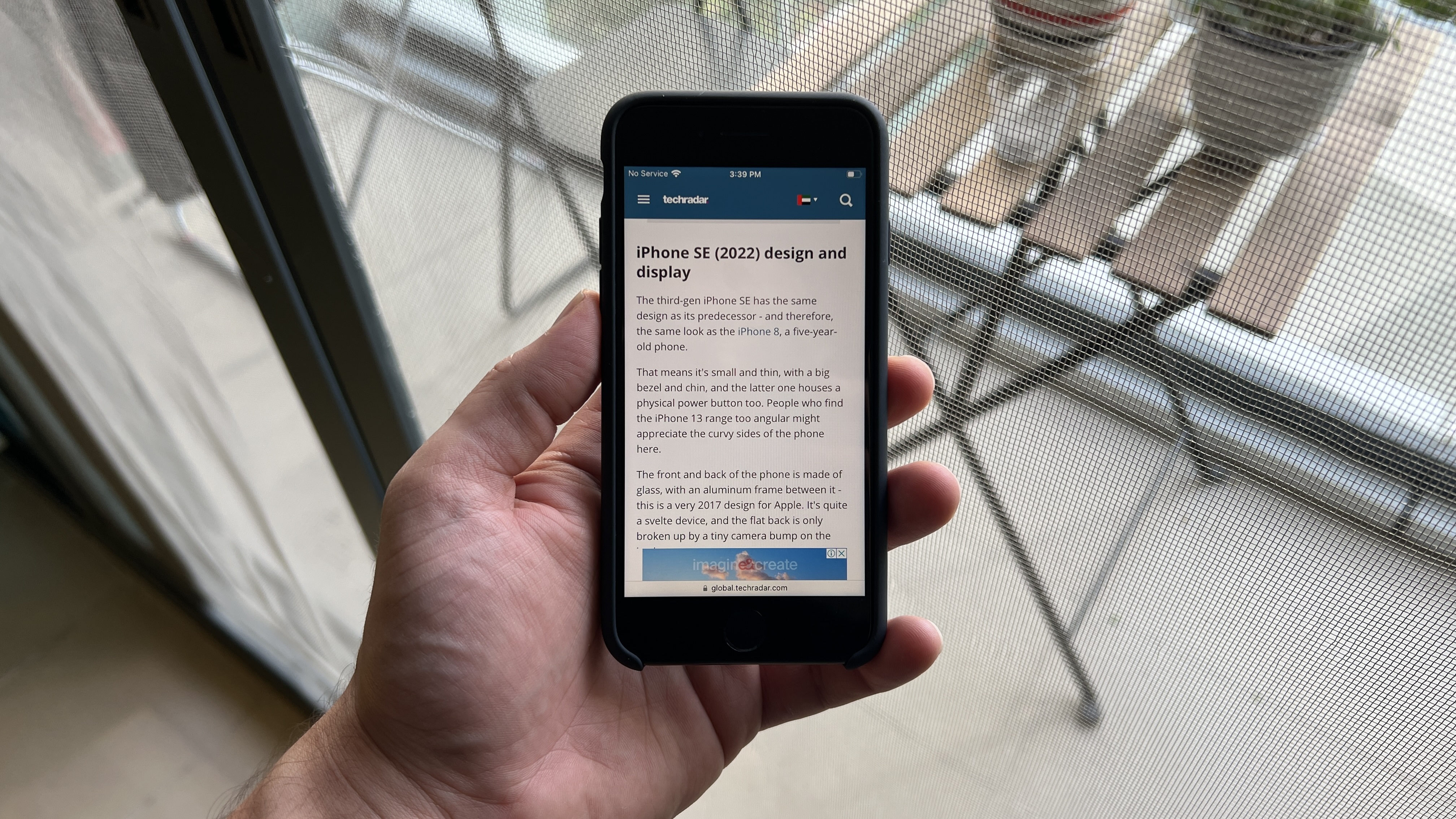
I've seen iPhone 8 handsets drop to the floor and crack faster than you can say "screen protector," and while you might assume that the iPhone SE, which shares much of the 8's DNA, would be similarly inclined, but might be wrong.
Both the front and back of the iPhone SE (2022) are built from the same glass that's on the back of all iPhone 13 phones. Sadly though, the SE doesn't get Apple's Ceramic Shield technology, so if you buy this phone, it still makes sense to spring for that silicone case.
Cameras
- 12MP wide camera takes lovely photos
- The 7MP front camera is no slouch either
- Thank the A15 Bionic
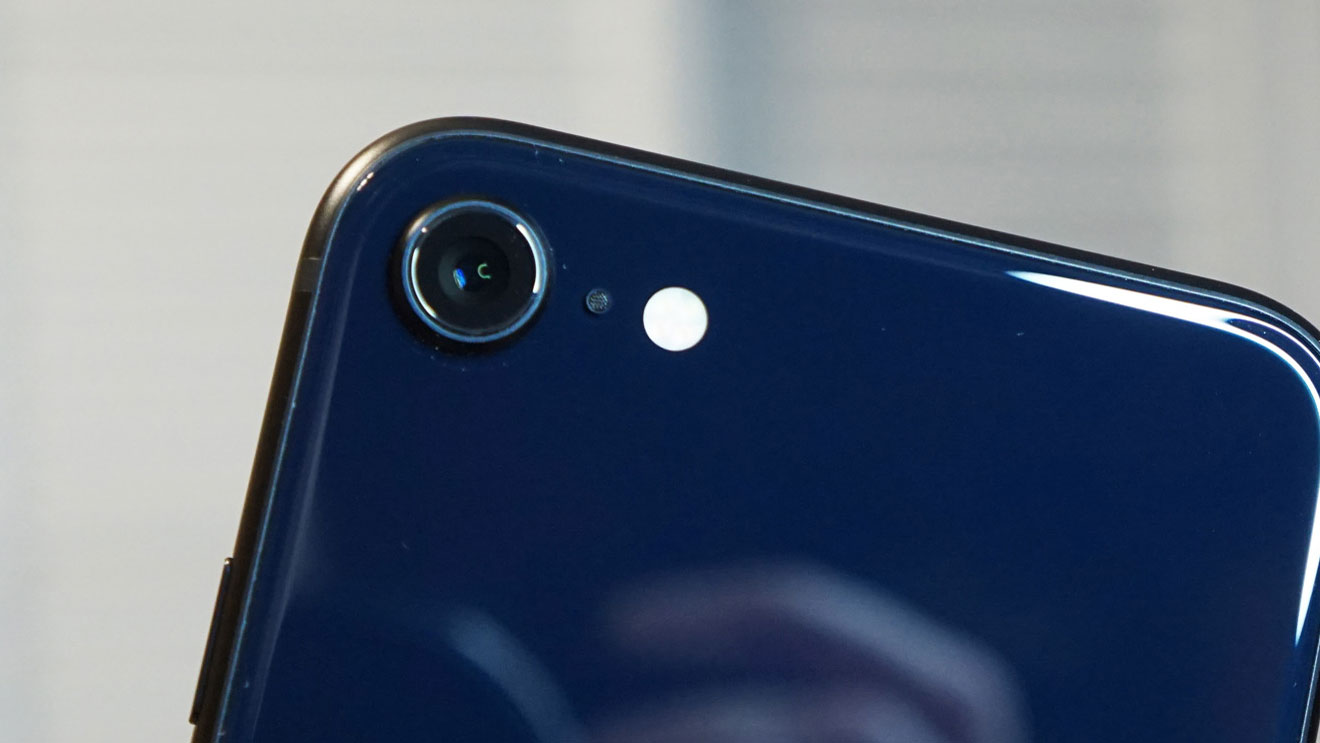
Our phones are increasingly also our cameras these days, and any handset that skimps in this area is asking for trouble. Even though the iPhone SE (2022) is graced with just two lenses that are the same as those on the SE 2020, it manages to take photos that are pleasing to the eye, color-accurate, and often beautiful.
The rear 12MP, f/1/8 wide lens is now backed by the A15 Bionic's image processing and supported by Smart HDR 4 and Deep Fusion (introduced with the A13 Bionic and present in the last iPhone SE).
I took the phone out to test the cameras, and was pleased not only by the image quality they delivered but with the speed. There's optical image stabilization which meant I didn't always have to plant my feet and stand perfectly still to grab a good-looking shot (video is supported by optical image stabilization, as well).
In Portrait mode you can adjust a faux-aperture setting to control the depth of field effect, throwing more of less of the background behind your subject out of focus. I was a bit frustrated, however, that the iPhone SE Portrait Mode photography is still limited to people - you can't shoot bokeh shots of dogs, plants, or anything else without a face.

Apple iPhone SE 2022 Portrait Mode tests



The camera does support all the other expected photos styles. including panorama and time lapse - and new here is Night Timelapse, which you can use with a tripod, though there's no support for Apple's Night Mode still photography.
On the video front, the iPhone SE can shoot all the way up to 4K 60fps. Footage looks good on the phone's screen, although, some resolution is obviously lost in the 1334x750 display.
The phone also shoots smooth 1080P, 240 fps slow motion. I chased some pigeons and got a truly cinematic shot.
Speaking of Cinematic, even with the A15 Bionic, there's no support for the Cinematic mode video you'll find on the entire iPhone 13 line.
The quality of Portrait Mode for both the front and back camera is better than what we experienced on the iPhone SE (2020). It's now capable of picking up tiny details, like wisps of hair, and carefully separating them from the blurred background. I found virtually no anomalies - blurred details that should have been sharp, and vice versa - that ruined the effect.
Overall, the photo quality on this mid-range phone can still rival that of competitors' handsets selling for almost twice as much.
Camera samples
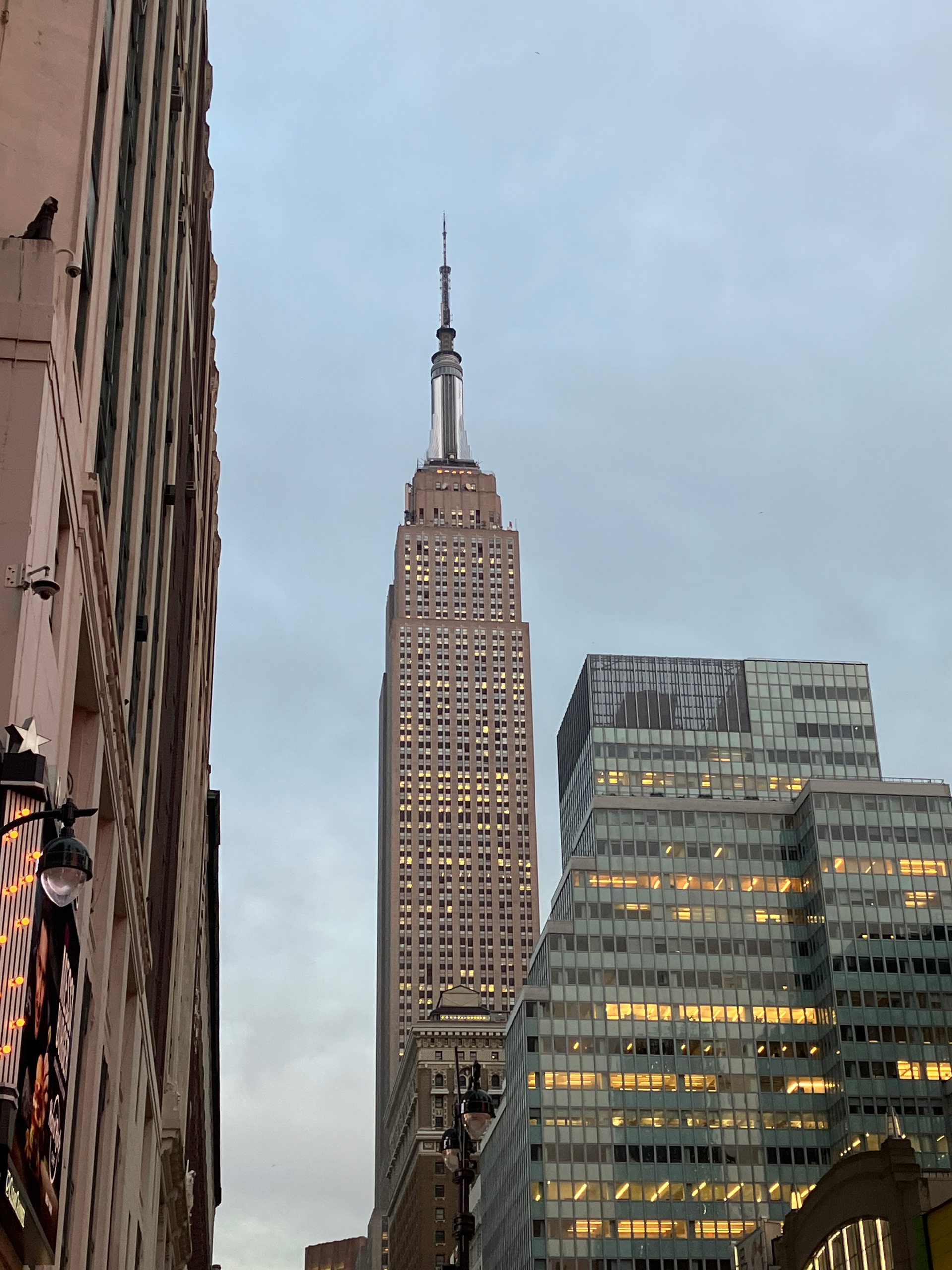
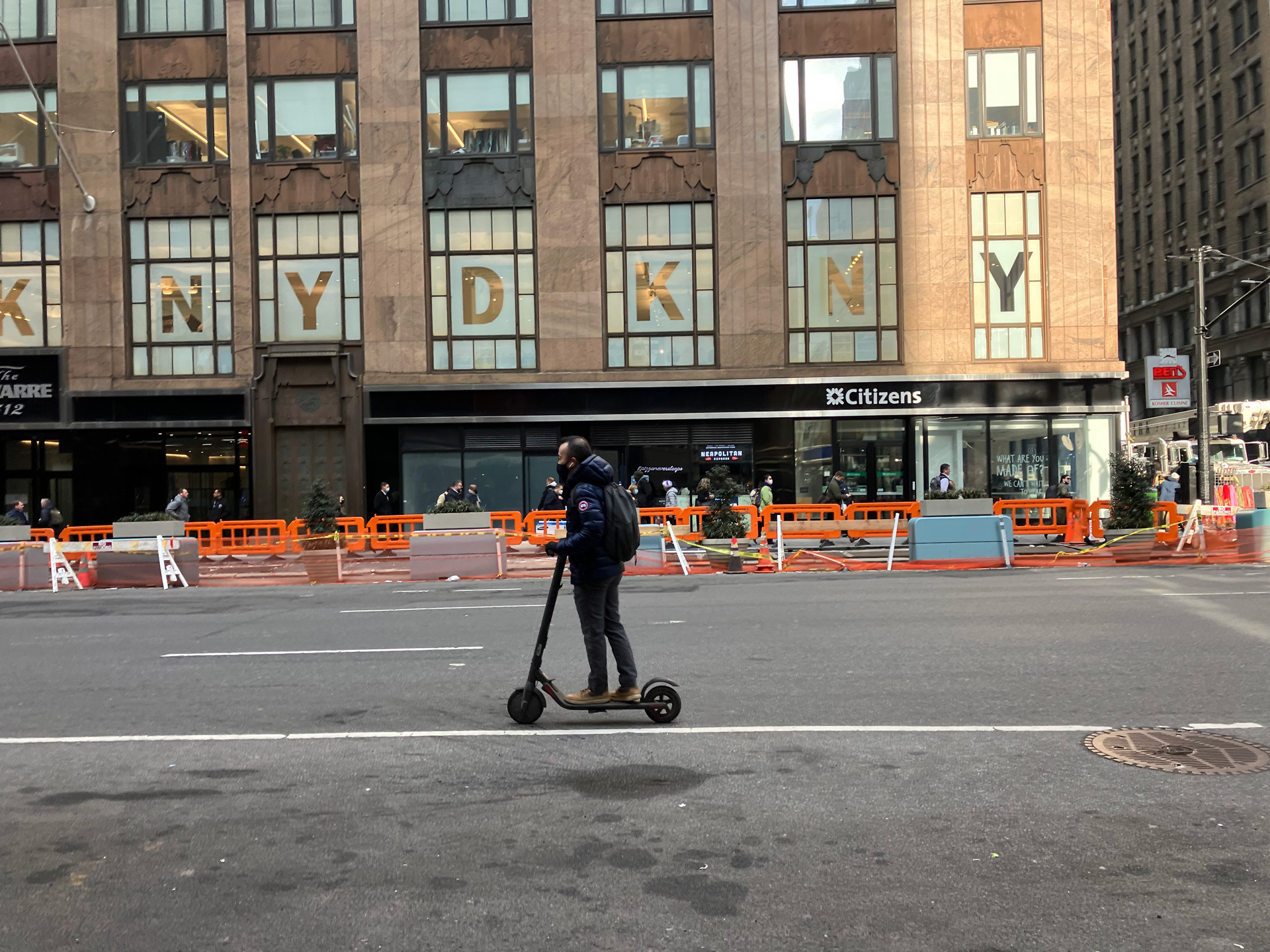


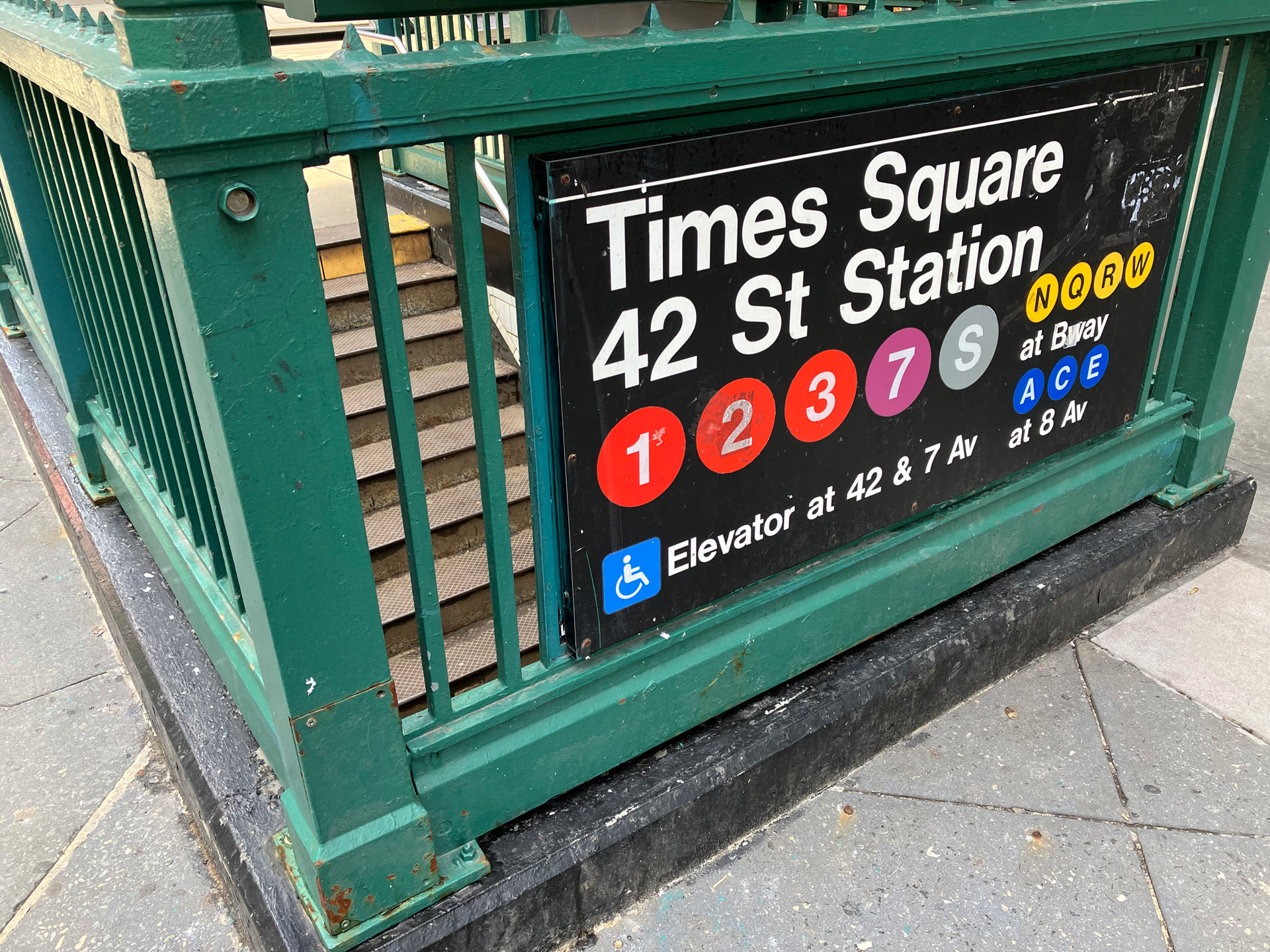




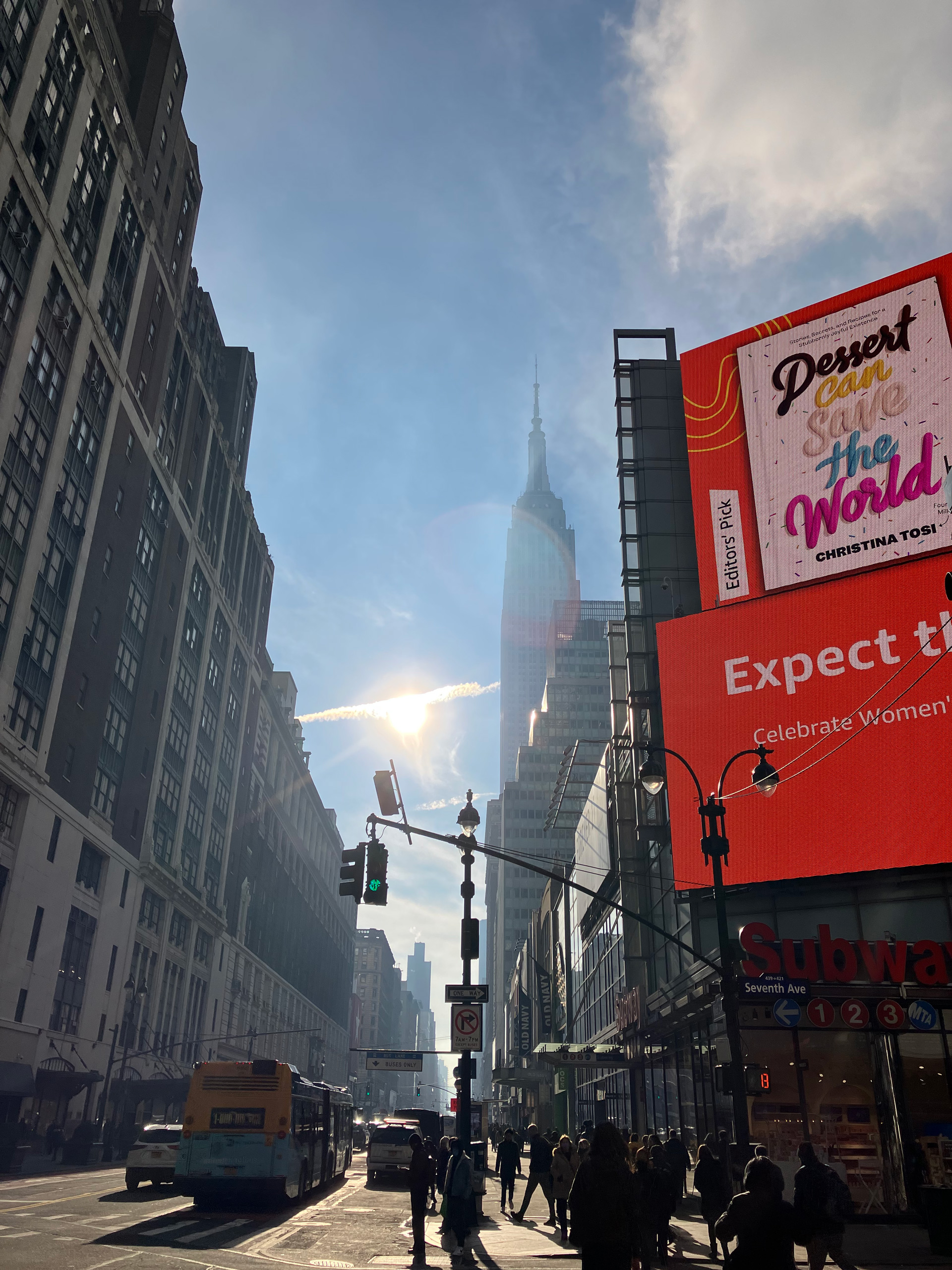
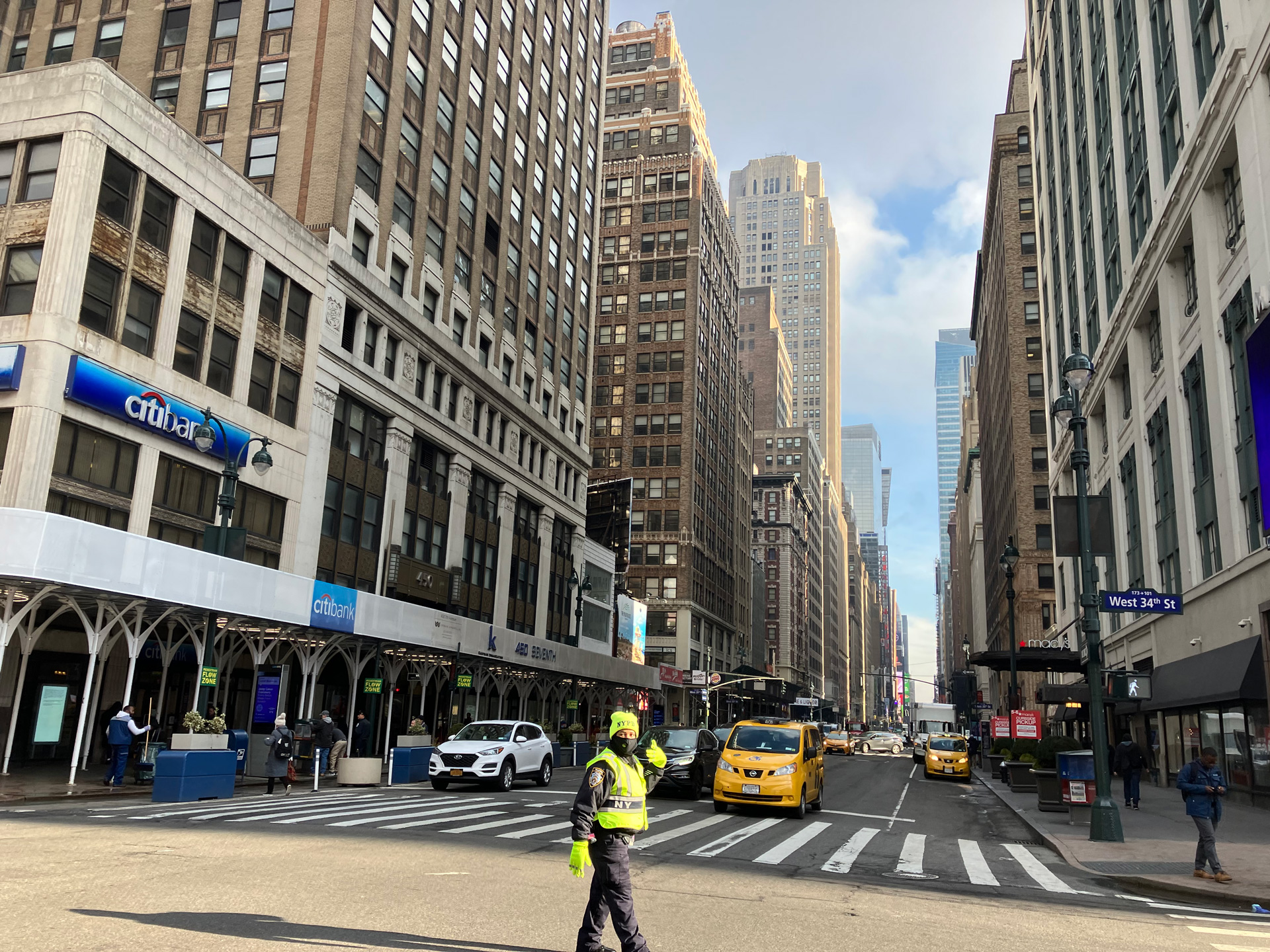

Performance and specs
- iPhone 13 power in a mid-range phone
- Chipset is power efficient
- 5G is good if you can get it
Apple's total control over its manufacturing processes and component lines makes it easy to take one cutting-edge element from its newest products and fit it neatly into a design it cooked up more than three years ago.
The A15 Bionic is Apple's most powerful mobile processor, and putting it into the iPhone SE's tiny frame is akin to strapping rocket motors to a bicycle.
To be clear, this is not some stunted or throttled version of Apple's chip. Geekbench 5 numbers put the iPhone SE (2022) on equal footing with the A15 Bionic in the iPhone 13 mini. It's worth noting that the phone now has 4GB of RAM, which will certainly help with performance.
Basically, everything that's good or better about this phone (4K video shooting and editing, console-level gaming, AI-enhanced photography) is better because of the A15 Bionic. It pushes the boundaries of what's possible within the confines that 2017 design dictates.
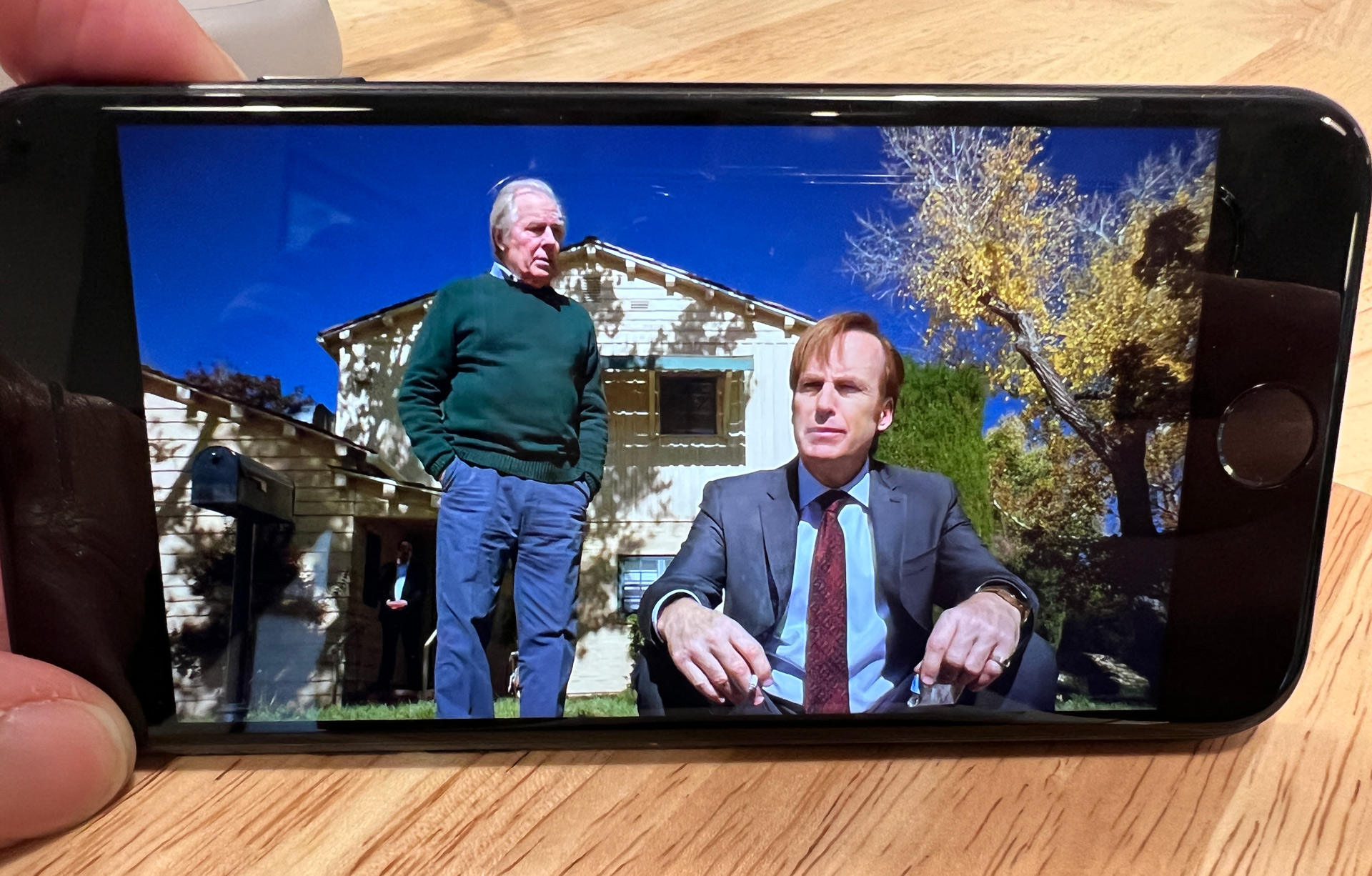
The iPhone SE (2022) welcomes the SE line into the iPhone 5G family. Again, the approach is full-boat, with no skimping on power or performance. This meant we could turn off WiFi, download apps, play multi-player games like Call of Duty, and stream HD Netflix without hesitation.
It was all so much fun, it almost made me forget about the too-small 4.7-inch display.
5G is still unavailable in some areas and its performance can be wildly inconsistent. In the office, my download speeds varied from one place to another by over 60Mbps.
In some places, I had to console myself with just LTE speeds. Still, it's kind of wild to have such an affordable iPhone with such impressive powers of connectivity.
Battery life
- Battery life to survive most the day
- Chipset efficiencies help offset 5G power suck
- Wireless charging is always welcome
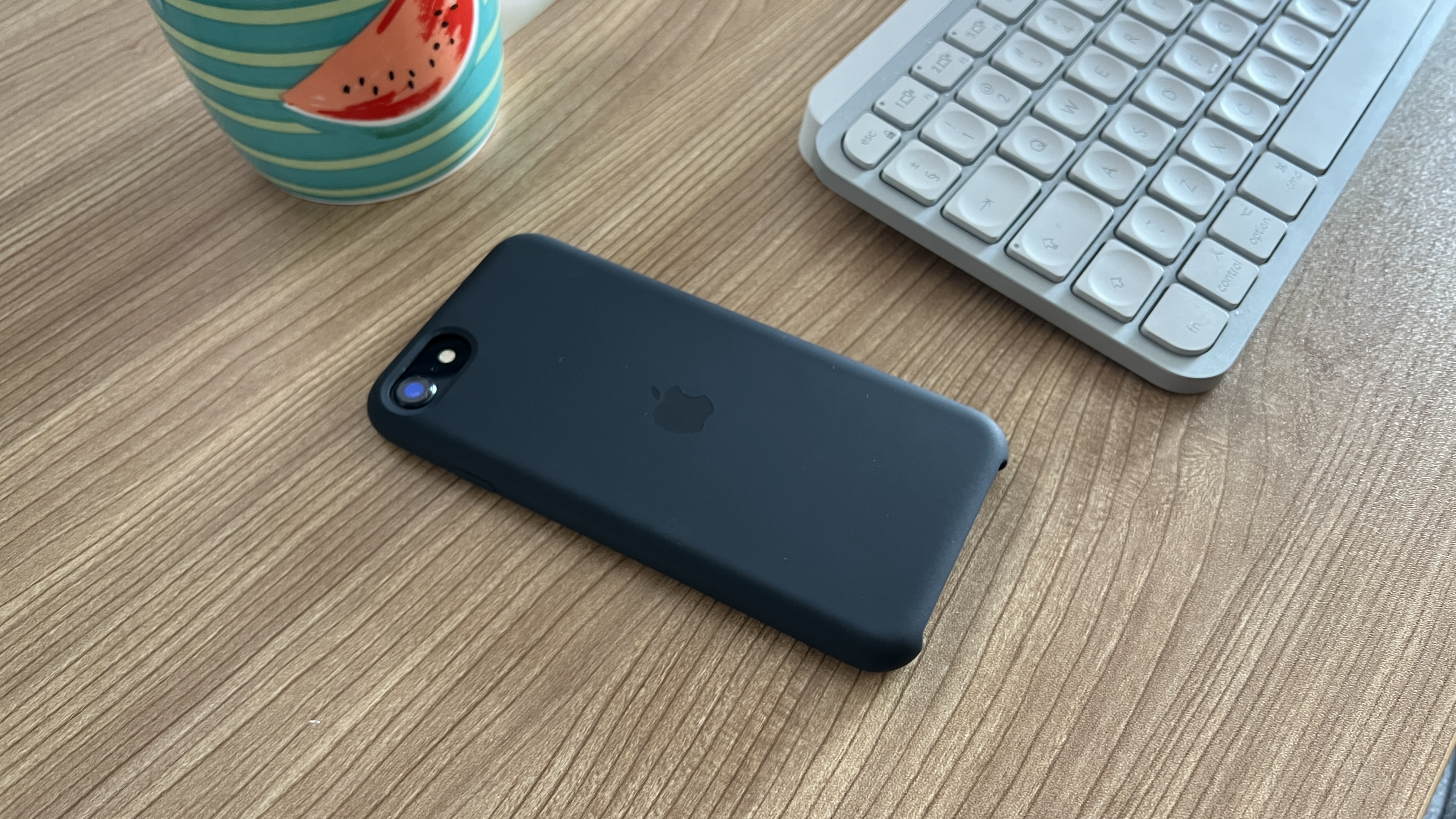
While I don't know the size of the iPhone SE battery (Apple never announces mAh), it's a fair bet that it hasn't changed much since the iPhone SE (2020). Even so, I expected some serious battery fall-off from the more powerful A15 Bionic and that tasty new 5G.
The reality is, even with 5G running all day and non-stop activity across a wide range of functions, I got 12 hours of battery life. Apple claims 15 hours of video playback (not streaming), and I can believe that, too.
When it's time to recharge, you can do so with the included cable at 18W (go find your own USB-C power adapter!) or by placing it on a Qi-compatible charging base. The phone does not support Apple's new MagSafe chargers.
Should I buy the iPhone SE (2022)?

Buy it if...
You want today's processors and 5G
This is a 5G smartphone that does not skimp on performance or connectivity.
You hate change
This is a classic design that holds up. Even Touch ID is like welcoming back home a dear old friend. Better yet, none of it acts or works like yesterday's technologies. The Touch ID is still an impressive technological feat.
Big is not you
This is not only Apple's joint-thinnest phone, it's basically the same weight as the iPhone 13 mini but without the edges. We love holding this device.
Don’t buy it if...
You want a great screen
The iPhone SE (2022) has a 4.7-inch display that reminds us of bygone days and not necessarily in a good way. It's too small and struggles in direct sunlight. If you want big and bold, this is not for you.
You want touch-free unlocking
Touch ID means what it says, you must put a digit on the button to unlock the phone. If you want Face ID for not much more, look to the iPhone 11.
You want more lenses
The photography here is good but limited. No zoom, no ultra-wide, no Portrait Mode shots of your dog.
- First reviewed March 2022

A 38-year industry veteran and award-winning journalist, Lance has covered technology since PCs were the size of suitcases and “on line” meant “waiting.” He’s a former Lifewire Editor-in-Chief, Mashable Editor-in-Chief, and, before that, Editor in Chief of PCMag.com and Senior Vice President of Content for Ziff Davis, Inc. He also wrote a popular, weekly tech column for Medium called The Upgrade.
Lance Ulanoff makes frequent appearances on national, international, and local news programs including Live with Kelly and Mark, the Today Show, Good Morning America, CNBC, CNN, and the BBC.
